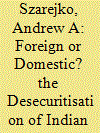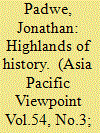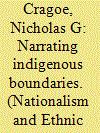|
|
|
Sort Order |
|
|
|
Items / Page
|
|
|
|
|
|
|
| Srl | Item |
| 1 |
ID:
188994


|
|
|
|
|
| Summary/Abstract |
Is securitisation normatively undesirable? Many scholars who have studied this process by which issues come to be treated as pertaining to ‘security’ have argued that it is indeed preferable to keep as many issues as possible from being securitised. Rather, most issues ought to remain politicised such that they are seen as the legitimate subject of public debate. By contrast, I argue that we ought not to ascribe any inherent moral valence to securitisation or the reverse process of desecuritisation. Instead, each attempt to (de)securitise an issue ought to be debated on its own terms. To support my argument for the moral ambiguity of (de)securitisation, I examine the US Senate’s debate over whether to transfer the Bureau of Indian Affairs from the Department of War to a new Department of the Interior in 1849. I argue that this is an inflection point in a longer desecuritising process by which the United States – acting on a presumed hierarchy – coercively assimilated Native nations into its domestic political order. I conclude that scholars should not discard (de)securitisation as an analytical tool but can instead use work on (de)securitisation to inform public debate on the likely consequences of any particular (de)securitising move, thereby serving a chastening role in public discourse.
|
|
|
|
|
|
|
|
|
|
|
|
|
|
|
|
| 2 |
ID:
127084


|
|
|
|
|
| Publication |
2013.
|
| Summary/Abstract |
The notion that Cambodia's highland people may claim a distinct 'Indigenous' identity has emerged only recently in Cambodia. To date, advocacy for rights under the banner of indigeneity has produced few results for highlanders. Among the problems faced by advocates for Indigenous rights, problems of definition and translation represent an important challenge. Arguing that concepts like 'Indigeneity' are not simply adopted ex nihilo in new settings, but are rather incorporated into existing structures of meaning, this paper explores culturally produced understandings of who highlanders are, concentrating in particular on the way that the term 'Indigenous' has been translated into Khmer. The use of the Khmer word daeum, or 'original', to distinguish between Indigenous and other forms of ethnic belonging in the newly derived translation of 'Indigenous Peoples' points to historically sedimented beliefs about highlanders as living ancestors of modern Khmers.
|
|
|
|
|
|
|
|
|
|
|
|
|
|
|
|
| 3 |
ID:
101756


|
|
|
|
|
| Publication |
2010.
|
| Summary/Abstract |
The articles in this, the one of three special issues of Alternatives on the theme of indigenous politics in the globalizing world, deal with important questions: How are the flows of people and ideas as well as the institutions to manage them impeded or assisted by the state and other social, political, and economic institutions? What does improved knowledge and understanding of these flows contribute to how one defines an indigenous community? What role do global technologies play in linking migrant and diasporic communities to each other and to the homeland? Authors in this issue articulate the local, national, and global contexts in which indigenous identity, interests, and consciousness are constructed and reconstructed through the case studies of Australia, Taiwan, Latin America, and Hawaii and produce novel perspectives that replace conventional understanding of indigenous politics. Instead of depicting indigenous people as passive victims of neoliberalism, globalization, and technological development, these studies illuminate agency, strategies, and the subjectivity of indigenous resistance in the twenty-first century.
|
|
|
|
|
|
|
|
|
|
|
|
|
|
|
|
| 4 |
ID:
076456


|
|
|
| 5 |
ID:
153599


|
|
|
|
|
| Summary/Abstract |
This article examines two narrative case studies, one biography and one traditional indigenous story, as they inform the dynamics of community, politics, and nationhood for Anishinaabe indigenous people in northern Minnesota. The narratives both provide power and legitimacy to Anishinaabe national identity but inform different political projects of decolonial and postcolonial nationalism, respectively, complicating both settler and indigenous attempts to define indigenous nationhood in a way that is fixed and static. This finding is used to critique the dominant nation-state centric notions of nationhood and to propose alternative modes of understanding nationhood in the context of indigenous politics.
|
|
|
|
|
|
|
|
|
|
|
|
|
|
|
|
| 6 |
ID:
132072


|
|
|
|
|
| Publication |
2014.
|
| Summary/Abstract |
Indigenous politics and history are central to and, indeed, intertwined with the history and politics of many if not most contemporary nations, yet the topics of indigenous politics and settler colonialism are rarely taught in undergraduate political science programs. This article outlines the pedagogical utility of an undergraduate course focused on indigenous history and politics, approached through a comparative race politics framework. The course on which this article is based compares state power and indigenous rights in the United States, Australia, and Latin America in historical context, but many variations are possible. The article first reviews the context for developing the course, the challenges related to teaching the subject, and my primary teaching objectives. It then outlines three pedagogical strategies applicable in other course frameworks and discusses positive learning outcomes I have observed as I refine this teaching area.
|
|
|
|
|
|
|
|
|
|
|
|
|
|
|
|
|
|
|
|
|